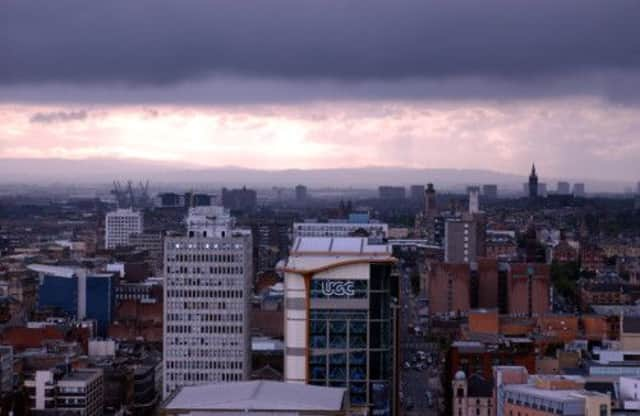Euan McColm: Working on Glasgow’s workless statistic


The history of Scotland’s largest city is peppered with romantic tales of marching for jobs, organising against bosses, and, all the while, taking pride in one’s labours. The work ethic saturates the comforting stories Glaswegians (of whom I am one) tell themselves about themselves.
But those are just stories. The contemporary reality is that Glasgow now has more workless households than anywhere else in the UK.
Advertisement
Hide AdAdvertisement
Hide AdThis grim news comes via the Office for National Statistics which, last week, placed the city at the top of the most depressing league table. Liverpool, a city with a similar pride in its working class heritage, must content itself with second place now that more than 30 per cent of households in Glasgow have nobody between the ages of 16 and 64 in employment.
The city’s nostalgics may have heart-stirring stories of Glasgow as second city of the Empire, but increasing numbers of residents have been dragged into unemployment or laid low by long-term ill-health.
It seems foolish to suggest things are not as bad as they seem, but Glasgow’s status can, to some extent, be explained by the fact that the traditional middle classes, many of whom work in the city, live outwith its boundary. Were the ONS to include suburbs which lie in other council areas but which we might describe as being part of “greater Glasgow”, the picture would be quite different.
But the good people who, after a day working in the city, return home to Giffnock, Bearsden and Newton Mearns do not figure. The middle classes abandon the city at dusk.
Glasgow’s ignoble achievement demanded a political response. The Scottish Government, said Finance Secretary John Swinney, had invested heavily – £3 million this year, alone – to help young people find jobs. Next year’s Commonwealth Games would mean an employment dividend, too. Although the promise of “1,300 places for local people to participate in jobs schemes” doesn’t sound quite the same as “1,300 jobs”.
Labour’s deputy finance spokeswoman, Jenny Marra, said there had to be a living wage, while Liberal Democrat leader Willie Rennie called, in an infuriatingly vague intervention, for the UK and Scottish governments to work together to give people hope.
The truth is that politicians don’t have easy solutions to the problem. This is because there are none. Politicians can, perhaps, most easily address one aspect of this. Glasgow city centre – like all city centres – has changed dramatically in just a few years. The only growth on the high street would appear to have been in the number of pop-up, cash-only sweet shops. If retailers, crushed by online shopping and out of town malls, are moving out, someone has to be found to replace them. The answer lies in trying to entice back companies who moved their office staff to cheaper industrial estates.
There is a far more problematic aspect to the story of families without work. Councillors and officials may be able to see ways of revitalising the city’s property and infrastructure, but tackling a lack of ambition that sees some of the city’s residents grow up without an expectation that they might ever work is far more difficult.
Advertisement
Hide AdAdvertisement
Hide AdBut it’s here that Glasgow City Council’s education department may be making some progress. A stated aim of the department is that aspiration will be encouraged in children. A nice sentiment, but it’s backed up by some interesting work.
Mainstream political debate might still be hung up on the notion that smaller class sizes for all is the answer to every child’s education problems. In Glasgow, they’re targeting the children most in need. A number of factors – whether a child receives free meals, is a carer, lives in a certain area – combine to give a picture of the challenges he or she might face. Using this risk matrix, the kids most likely to lose interest in education can be identified and support – pastoral care as much as teaching – can be offered.
Over the past five years, school attendance in Glasgow has risen from 82 to 91 per cent. Alongside more carefully directed attention towards youngsters in need, measures such as a return to compulsory uniform (supplied by the authority, if necessary) are credited by staff for improving self-esteem among pupils.
But there is only so much a school can do. Good teachers may be able to instil in a child the desire to do well and to aim for further or higher education. These teachers may even succeed in doing so throughout a child’s school career, despite the indifference of parents. Once a child leaves school, however, there is nothing those teachers can do.
Perhaps there’s a role for Skills Development Scotland, the public body established in 2008 to improve the employability of the potential workforce, in tracking youngsters who previously depended on the support of teachers and education department staff. It certainly seems to make sense that if teachers are able to identify children who require greater support to aim higher, those same youngsters should have that assistance throughout their education, beyond school and through college or university.
The work being done by Glasgow City Council’s education department won’t change things overnight, but national politicians serious about improving the prospects of young people and in breaking the cycle of low self-esteem and nonexistent ambition that holds too many back should encourage – and might learn from – some serious work being done in the city. «
Twitter: @euanmccolm